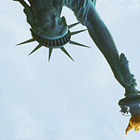#35 The philosophy we need for today’s broken world
Trump’s tariffs are just another symptom. The real disease is distrust—and it threatens not just the economy, but the very social progress we’ve spent decades building.
Welcome to 3X, the publication about living a meaningful life, read by 3000 people every week
Beyond tariffs
Trump’s new tariffs made headlines. But they’re just a symptom of something deeper: a collapse in trust—in science, in technology, in each other.
In Europe, AI is being regulated before it’s even deployed. Nuclear plants are being shut down in the middle of an energy crisis. During COVID, vaccines were delayed by debates over national approvals and distribution fairness.
Tariffs are just a symptom. The disease is distrust.
And the risks go far beyond economic downturns—they threaten to undo the very miracles we’ve achieved over the last century.
The miracles of Trust
The last century delivered miracles.
Life expectancy more than doubled. Child mortality fell by over 90%. Global poverty dropped. Electricity, education, and healthcare reached billions. Diseases that once wiped out entire populations were eliminated. We walked on the moon and built machines that learn.
We live longer, safer, more dignified lives than at any point in history.
These achievements didn’t happen because we were cautious. They happened because we believed progress was possible—and trusted ourselves to build it.
We trusted science, and developed antibiotics, vaccines, solar energy, and space flight.
We trusted technology, and scaled the internet, air travel, and clean manufacturing.
We trusted institutions, like the WHO, the WTO, and the EU—which helped eradicate disease, open up markets, and turn historical rivals into partners.
And we trusted each other, enough to open trade, share research, and work across borders.
Progress wasn’t perfect. But it worked—because trust made it possible.
The worst time to distrust
Today, we stand on the edge of another historic leap.
AI can accelerate scientific discovery, healthcare, and education.
CRISPR and gene editing can cure diseases once considered untreatable.
Fusion power is closer than ever and can solve climate change
Reusable rockets, zero-emission aviation, and space-based manufacturing are already being tested.
The breakthroughs are real. The tools are here.
But just as these possibilities come into view, we’re pulling back—not because they don’t work, but because we don’t trust them.
And, as we have seen, the consequences are real:
Sri Lanka banned synthetic fertilizers and collapsed its food system
mRNA vaccines were delayed by bureaucracy, in the middle of a pandemic
Europe’s AI restrictions threaten to smother innovation before it begins
Nuclear energy is being shut down in a time of global energy crisis
Tariffs are rising again, threatening the affordability and access that global trade made possible
This isn’t just caution. It’s a pattern.
Distrust doesn’t prevent harm, it causes it.
An old shared philosophy
The world feels broken—because we’ve stopped trusting the forces that built it.
And what’s at risk isn’t just economic stability. It’s the very prosperity that made our lives safer, longer, and better. Unless we restore trust—in science, in technology, in each other—we won’t just stall.
We’ll go backwards.
We won’t solve climate change. We won’t cure diseases. We won’t reduce poverty.
Not because we can’t—but because we didn’t dare to try.
The solution isn’t new—but it’s harder than ever to act on. In a fractured world, we must reclaim the very philosophy that built our prosperity in the first place.
We call it progress. And it means:
Driving societal progress is a responsibility, not a luxury
Believing in science, even when it challenges our instincts or ideologies
Betting on technology, while managing risks without defaulting to fear
Recognizing that global collaboration and trade, though imperfect, enable shared prosperity
Choosing optimism, because the first step toward building a better world is believing it’s possible
Moving fast, because hesitation carries a human cost
Progress doesn’t mean ignoring risks. It means acting in spite of them.
It means building anyway.
Much better. Still awful. Can be better.
If we need a guiding principle for this moment, Our World in Data offers one:
Much better. Still awful. Can be better.
It’s not just a slogan—it’s a map. And it points us straight back to trust.
Because to see that the world is much better is to recognize that progress works—when we trust science, technology, and cooperation.
To acknowledge that it’s still awful is to admit we’re not done.
And to believe it can be better is to take responsibility for what comes next.
This isn’t about left or right.
It’s about the future—or the lack of one.
It’s easy to criticize. Easy to play it safe. But as the saying goes:
Easy choices, hard life. Hard choices, easy life.
History doesn’t remember the skeptics. It remembers the dreamers. The builders. The ones who chose trust over fear.
Thanks for reading 3x!
If this resonated with you, hit the ❤️ and leave a comment—it means a lot. And if you know someone who’d appreciate it, share it via email, WhatsApp, or on social media. Good ideas are better when shared.
Subscribe just below to stay in the loop. 👇
Related articles & podcasts






